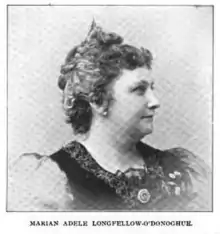
Marian Adele Longfellow O'Donoghue (April 1, 1849 – January 23, 1924) was an American writer, one of the founders of the National League of American Pen Women, in 1897.
Early life
Marian Adele Longfellow was born in Portland, Maine, the daughter of Stephen Longfellow and Marianne Preble Longfellow. Poet Henry Wadsworth Longfellow was her uncle. Her grandfather, William Pitt Preble, was a judge and diplomat.[1]
Career
Marian Longfellow O'Donoghue wrote poetry and stories for newspapers, collected for publication as Seven Stories of Christmas (1884), The Lily of the Resurrection (1885), Snow Crystals (1885), and Contrasted Songs (1904).[2] She sometimes used the pen named "Miriam Lester."[3] Longfellow also translated Eugène Sue's A Romance of the West Indies from French (1898).[4] Some of her poems were set to music as Christian hymns.[5]
She was a charter member of the Daughters of the American Revolution,[6] a charter member of the National Society of New England Women,[7] and served on the board of directors of the Washington Choral Society.[8]
In 1897, after being rejected for membership in the Washington Press Club,[9] she, Margaret Sullivan Burke, and Anna Sanborn Hamilton founded the National League of American Pen Women. O'Donoghue wrote the organization's bylaws and constitution.[10] She was the only woman elected to the executive committee of the International League of Press Clubs in 1898.[8] She was a "prominent member" of the California State Association in Washington D. C. while her husband was serving as president of that organization in 1906.[11]
Personal life
Marian Longfellow married twice: first to Englishman William Morris, with whom she had three children. They divorced. Her second marriage was to Michael Francis O'Donoghue, an Irishman and fellow writer. She was widowed when he died in 1921.[12] Marian Longfellow died in 1924, aged 74 years, in Shawmut, Tuolumne County, California, where she was living with her son Henry Wadsworth Morris.[13]
References
- ↑ Walter Gerald Cooper, The Cotton States and International Exposition and South, Illustrated (Illustrator 1896): 181.
- ↑ Marion Longfellow, Contrasted Songs (R. G. Badger 1904).
- ↑ "The International League of Press Clubs" Overland Monthly and Out West Magazine (June 1897): 633.
- ↑ Eugène Sue, A Romance of the West Indies, trans. Marian Longfellow (F. Tennyson Neely 1898).
- ↑ Marian Longfellow, "He Knows the Bitter, Weary Way" (1874), at Hymnary.
- ↑ Marion Howard Brazier, "Spokes from the Hub" American Monthly Magazine (October 1911): 219.
- ↑ E. Marguerite Lindley and Juniata Leland, "National Society of N. E. Women" New England Magazine (February 1906).
- 1 2 "Mrs. O'Donoghue's Literary Fame" The Times (March 6, 1898): 28. via Newspapers.com

- ↑ C. A. Lindsay, Rich Writer Poor Writer (Lulu.com 2016): 82. ISBN 9781365064159
- ↑ Agnes Hooper Gottlieb, "National League of American Pen Women, 1897 to Present" in Elizabeth V. Burt, ed., Women's Press Organizations, 1881-1999 (Greenwood Publishing 2000): 146-147. ISBN 9780313306617
- ↑ "Californians in Washington Campaign for Those at Home" Washington Times (April 24, 1906): 12. via Newspapers.com

- ↑ "M. F. O'Donoghue, State Society Founder, Dead" Oakland Tribune (June 2, 1921): 2. via Newspapers.com

- ↑ "Longfellow's Niece Dies in Mine Town" Oakland Tribune (January 23, 1924): 4. via Newspapers.com

External links
- A picture of Marian Longfellow as a child, circa 1851, in the collection of the Maine Historical Society.
- Marian Longfellow O'Donoghue at Find a Grave
- Sheet music for Longfellow's "The Eagle and the Dove a Call to Arms", a song she wrote during World War I, in the collection of the Library of Congress.
- Works by Marian Longfellow O'Donoghue at LibriVox (public domain audiobooks)
